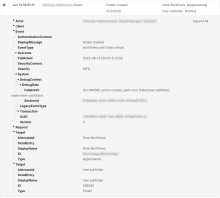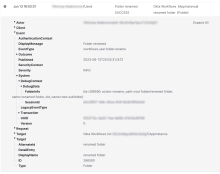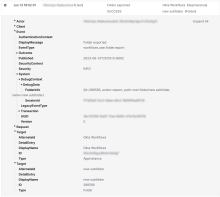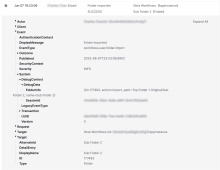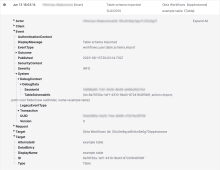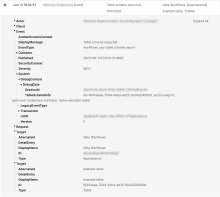Production release notes
Help us improve our release notes by filling out this short survey.
Current release status
| Current | Upcoming | |
|---|---|---|
| Production | 2023.08.2 | 2023.08.3 Production release is scheduled to begin deployment on September 5 |
| Preview | 2023.08.2 |
2023.08.3 Preview release is scheduled to begin deployment on August 30 |
August 2023
2023.08.0: Monthly Production release began deployment on August 14
* Features may not be available in all Okta Product SKUs.
Generally Available Features
Okta AD agent, version 3.16.0
When the executor.log and coordinator.log files exceed 5 MB in size, the contents roll over into executor.log.old and coordinator.log.old files.
Okta Active Directory Federation Services Plugin, version 1.7.13
Version 1.7.13 of the Okta Active Directory Federation Services (ADFS) Plugin is now available for download. It includes support for Microsoft Windows Server 2022 and includes bug fixes and security hardening. See Okta ADFS Plugin version history.
Telephony inline hook required for phone authenticator
New orgs now require a Telephony inline hook to use the phone authenticator. You can connect an external telephony provider with Okta using the inline hook. See Phone authenticator. Alternatively, you can acquire the Okta SMS/Voice SKU.
Redesigned resource set pages
The Create new resource set and Edit resource set pages that are displayed when an admin creates or edit a resource set now provide a simpler, more intuitive user experience. See Create a resource set.
Hardware-protected FIDO2 WebAuthn available
Hardware-protected FIDO2 WebAuthn as defined by the FIDO Metadata Service is now available in authentication policies when the Hardware-protected checkbox is selected. See About MFA authenticators.
Integrate with any identity source
To get Okta's full HR-driven provisioning and LCM functionality for an HR integration, customers previously had to use one of five pre-integrated HR systems or build complex custom code with the Okta Users API to replicate some of Okta’s LCM functionality for other identity sources.
With Anything-as-a-Source (XaaS), customers now have the flexibility to connect any identity source to Okta and realize the full benefits of HR-driven provisioning with a simpler solution. See Anything-as-a-Source.
Smart Card authenticator available
You can add a new Smart Card authenticator that enables PIV to be used in authentication policies. You can also restrict the authentication policies to use only Smart Card Authenticator as MFA. See Configure the Smart Card authenticator.
Getting Started video for new orgs
The Getting Started page now displays an introductory video. The video provides a quick overview of the common tasks and functions for new orgs, and helps admins familiarize themselves with the Admin Console. See Get started with Okta.
API service integration client secret rotation in the Admin Console
New in this release is the ability to rotate client secrets for an API service integration through the Admin Console. Previously, if a customer wanted to update the client secret for an API service integration, they had to reinstall the integration to obtain a new client ID and secret. There was no option to revoke the client secret while maintaining the client ID and API service integration instance in Okta. With this new feature, customers can generate a new secret, deactivate an old secret, and remove a deactivated secret from the API service integration instance. These functionalities help customers implement security best practices without service downtime. See API Service Integrations.
New event hooks for User Auth Events
Two additional event hooks are now available under User Auth Events:
- User's session was cleared
- User's MFA factor was updated
New application lifecycle event hook
An event hook to deny user access due to a condition in an authentication policy is now available to admins. See Create an event hook .
Polling enhancements for Agentless DSSO
When the server is in SAFE_MODE, Agentless DSSO polling signs in a user if they are in ACTIVE state in Okta.
Early Access Features
Configure management attestation for mobile devices with pre-existing security key
You can now use a pre-existing secret key when you configure Device Management for mobile devices. If you upgrade from Classic Engine, you can reuse your secret key in Identity Engine. See Configure Device Management for mobile devices.
-
OKTA-575884
The Okta Active Directory Federation Services (ADFS) Plugin wrote errors to the plugin log when users attempted to sign in.
-
OKTA-595086
The display of the authorization server Access Policies page froze with large numbers of policies.
-
OKTA-596293
After upgrades to Identity Engine, users were sometimes asked to re-authenticate when refreshing their Okta dashboards even though the sessions were still valid.
-
OKTA-606898
Some users got stuck in a password expiration warning loop when they signed in with AD delegated authentication and updated their password.
-
OKTA-610347
Some orgs couldn't add more than 50 global session policies.
-
OKTA-617816
After orgs upgraded to Identity Engine, the application name in OV Push disappeared.
-
OKTA-626699
On the Administrator assignment by admin page, the Role dropdown list sometimes displayed duplicate admin roles.
-
OKTA-626968
The error message that appeared when the admin attempted to add an inactive Smart Card IdP to the authenticator didn't mention the name of the IdP.
-
OKTA-631657
Users were sometimes improperly redirected to a device-posture provider when none was configured in the authentication policy.
-
OKTA-631752
Adding some IdPs as Factor only caused errors.
-
OKTA-632786
Admins could require Smart Card in an authentication policy even when it wasn't set up as an authenticator.
Applications
New Integrations
New SCIM Integration applications
The following partner-built provisioning integration apps are now Generally Available in the OIN:
-
LeaseHawk: For configuration information, see Okta User Provisioning Integration with SCIM.
SAML for the following Okta Verified applications
-
Apache Kafta: For configuration information, see Configure SAML SSO for Confluent Cloud with Okta Identity Provider.
-
CloudSaver - Tag Manager: For configuration information, see How to Configure SAML 2.0 for CloudSaver Tag Manager for Admins.
-
Current: For configuration information, see Current’s Okta Integration.
-
Jasper AI: For configuration information, see Configuring Jasper Single Sign-On (SSO).
-
Kolide: For configuration information, see How to configure SAML for Kolide.
-
Reasons for Access: For configuration information, see Configuring Reasons for Access with Okta.
-
Teamspective: For configuration information, see Okta SAML Single Sign-On (SSO) for Teamspective.
OIDC for the following Okta Verified applications
-
AlphaSOC Console: For configuration information, see Okta SSO Integration.
-
Everlaw: For configuration information, see Organization Admin: Single Sign-On.
-
Flike: For configuration information, see Okta SSO Configuration Guide.
-
LeaseHawk: For configuration information, see How to Configure OIDC for LeaseHawk with Okta.
-
Valos: For configuration information, see Logging in with Okta Single Sign-On (SSO).
-
Yooz: For configuration information, see How to configure OIDC for Yooz.
-
Zello: For configuration information, see Okta SSO Configuration Guidelines.
Weekly Updates
Fixes
-
OKTA-619028
Read-only admins received user reports of suspicious activity email notifications in error.
-
OKTA-624193
The Access Testing Tool results showed an incorrect value for the profile enrollment self-service registration option.
-
OKTA-627533
Removing the emailAuthenticationLink variable from the email template didn't update the Sign-In Widget.
-
OKTA-631142
Orgs using a custom client_id in their OAuth2 client apps were unable to delete enrolled users.
-
OKTA-632131
OpenID Connect /token requests using the SAML 2.0 Assertion grant type flow failed if the SAML assertion expiry was greater than 30 days.
-
OKTA-632850
Slack provisioning didn't automatically retry after exceeding rate limits.
-
OKTA-633585
The on-demand auto-update banners for the Active Directory agent displayed updates in a random order.
-
OKTA-634923
Users weren't present in the import queue after being unassigned from an app.
-
OKTA-635579
When a super admin went to the tab, the Edit group assignments button was mislabeled.
-
OKTA-636652
The Administrators page wasn’t translated to Japanese.
Applications
Application Update
-
Group push and group import is now available for the Smartsheet SCIM integration.
New Integrations
New SCIM Integration applications
The following partner-built provisioning integration apps are now Generally Available in the OIN Catalog as partner-built:
-
Skippr for Organizations: For configuration information, see Skippr for Organizations with SCIM 2.0.
SAML for the following Okta Verified applications:
-
9Line: For configuration information, see Okta SAML SSO Configuration.
-
Blameless: For configuration information, see How to Configure SAML 2.0 for Blameless for admins.
-
Fathom: For configuration information, see SAML 2.0 Configuration Guide.
-
Y42: For configuration information, see Okta.
OIDC for the following Okta Verified applications:
-
rule5: For configuration information, see rule5 Okta Configuration Guide.
-
QuotaPath: For configuration information, see Okta SSO.
-
Rupert: For configuration information, see Rupert Okta SSO Configuration.
Fixes
-
OKTA-621214
Long custom label text was sometimes truncated on the Sign-In Widget during enrollment.
-
OKTA-621253
Email Change Confirmed Notification messages weren't sent if the audience was set to Admin only.
-
OKTA-627175
Some tasks displayed a greater-than sign (>) instead of the date.
-
OKTA-630368
RADIUS logs showed multiple, repetitious Invalid cookie header warning messages.
-
OKTA-634010
Users who were locked out of Okta but not Active Directory could receive Okta Verify push prompts and sign in to Okta.
-
OKTA-637641
Some users received a Bad Request error when they signed in with Okta FastPass.
-
OKTA-639427
When admins added a new user in Preview orgs, the Realm attribute appeared on the dialog.
Applications
New API Service Integration applications:
-
Sysdig: For configuration information, see Okta Integration.
OIDC for the following Okta Verified applications:
-
AskFora: For configuration information, see AskFora Okta Configuration Guide.
July 2023
2023.07.0: Monthly Production release began deployment on July 17
* Features may not be available in all Okta Product SKUs.
Generally Available Features
Sign-In Widget, version 7.8.0
For details about this release, see the Sign-In Widget Release Notes.
For more information about the Widget, see the Okta Sign-In Widget Guide.
Okta LDAP agent, version 5.17.0
This version of the agent contains:
- Migration of the Windows installer from Internet Explorer to Edge
- The service OktaLDAPAgent stop command now correctly terminates agents installed on Red Hat and CentOS platforms
- Security enhancements
System Log time zone formats updated
In the System Log, the time zone dropdown menu now provides additional information about each available time zone. See System Log.
App Password Health report uses browser time zone
On the App Password Health report, last-reset request dates and times are now based on the browser’s time zone settings. See App Password Health report.
Okta-generated client secret length increase
The length of Okta-generated client secrets is increased from 40 to 64 characters.
Updated Okta logo
A branding update to the Okta groups logo is now available in the Admin Console.
RADIUS sign-in error prevention
For orgs that upgraded from Classic Engine, if the Okta Verify authenticator is configured with number challenge, the challenge may be presented unexpectedly to RADIUS users. This can prevent users from using RADIUS with Okta Verify because RADIUS doesn't support the number challenge today. For upgraded orgs, a new feature is enabled that prevents any such errors. See RADIUS applications in Okta.
New authenticator management functionality
Okta now enables you to manage which authenticators are allowed in your org for new enrollments, authentication enrollment policies, and user verification. You can view a list of all Okta-recognized authenticators, create authenticator groups, and use them in policies. This allows admins to have greater control over which authenticators may be used in their orgs and determine which users may access them in a granular way. See Configure the FIDO2 (WebAuthn) authenticator.
Google Authenticator available for account recovery
Admins may now allow their users to initiate account recovery scenarios with Google Authenticator, Email, Phone, or Okta Verify. Increasing the number of options available for recovery enhances the user experience. See Configure the Password authenticator.
Early Access Features
Desktop MFA
Desktop MFA allows you to secure users' desktops with MFA. With this solution, you can customize the sign-in flow so that users are prompted for MFA methods after they enter a Windows password. See Desktop MFA for Windows.
IdP permissions for custom admin roles
Admins can now leverage new Identity Provider management permissions when creating custom admin roles. These permissions allow more precise access control and reinforce the principle of least privilege. See About role permissions.
Redesigned admin role pages
The Create a role and Edit role pages for custom admin-role configuration now provide a simpler, more intuitive user experience. See Create a role.
Admin Console Japanese translation
When you set your display language to Japanese, the Admin Console is now translated. See Supported display languages.
IME support for international characters
Admins can now use an Input Method Editor (IME) to type international characters into the Admin Console.
Front-channel Single Logout
Front-channel Single Logout (SLO) allows a user to sign out of an SLO-participating app on their device and end their Okta session. Okta then automatically sends a sign-out request to all other participating apps that the user accessed during their session. See Configure Single Logout in app integrations.
-
OKTA-556787
During step-up verification, multiple indistinguishable enrollments for the smart card authenticator were displayed. Now only one smart card authenticator enrollment is displayed.
-
OKTA-602939
The Admin role assignments report email wasn’t translated.
-
OKTA-615453
Some text strings were incorrect on the End-User Dashboard layout page.
-
OKTA-623542
The link to the Access Policy Simulation help topic on the Features page was incorrect.
Applications
Application Updates
-
The Rybbon app integration has been rebranded as BHN Rewards.
New Integrations
New SCIM Integration applications
The following partner-built provisioning integration apps are now Generally Available in the OIN:
-
Apono: For configuration information, see Okta SCIM.
SAML for the following Okta Verified applications
-
CodeREADr: For configuration information, see Supported Features.
-
Datto File Protection: For configuration information, see Single sign-on integration for Okta.
-
Emeritus: For configuration information, see Supported Features.
-
HackNotice: For configuration information, see Okta SAML Integration (Coming Soon).
-
Whosoff: For configuration information, see How to setup Okta SSO.
App Integration Fixes
The following SWA app was not working correctly and is now fixed:
-
BlueHost (OKTA-620224)
Weekly Updates
Fixes
-
OKTA-457661
Testing the Agentless Desktop Single Sign-on configuration with an active Okta session failed with an error.
-
OKTA-599540
HTTP replies to SP-initated SAML requests contained two session IDs, which sometimes caused user sessions to expire unexpectedly.
-
OKTA-605041
An unclear error message appeared when an admin created a role or resource set with a long name.
-
OKTA-606195
Some users couldn't access Okta on a shared workstation until they cleared cookies from the browser.
-
OKTA-606938
Log streaming apps were incorrectly included in the number of assigned apps shown for the default policy on the Authentication policies page.
-
OKTA-612727
The Admin Dashboard Tasks table displayed an incorrect amount of provisioning capable apps.
-
OKTA-612875
After managerId was removed from the Salesforce schema in Okta, it couldn't be added again.
-
OKTA-613076
In the Sign On tab of Office 365, the Okta MFA from Azure AD option appeared disabled. When the option was switched to edit mode, it was enabled.
-
OKTA-613162
Admin couldn't manually create a new user with a password when password was configured as an optional authenticator.
-
OKTA-613394
Users couldn't sign in with a PIV in an Org2Org flow.
-
OKTA-615345
Some admins couldn't view the password for SWA applications that were assigned a common username and password.
-
OKTA-615407
For custom SAML apps, the last-selected authenticator wasn't saved and reused for subsequent admin sign-in events.
-
OKTA-615441
Some users couldn't sign in with Agentless Desktop Single Sign-on because routing rules were re-evaluated during the sign-on process.
-
OKTA-615457
The Edit resources to a standard role page didn’t display apps that had the same name.
-
OKTA-617528
The auto-update schedules for the Active Directory and LDAP agents were incorrectly shown as up-to-date, even when a new version was released.
-
OKTA-617817
Admins were sometimes unable to access the Admin Console from a custom domain.
-
OKTA-618825
The Okta-hosted Sign-In Widget displayed the wrong error message to users who were locked out.
-
OKTA-619704
Newly provisioned users who signed in with a PIV prior to setting a password couldn't set a password later without admin intervention.
-
OKTA-620153
ACS URL validation failed for orgs that used SAML SSO with Okta-to-Okta IdP configurations and had subdomain names that weren't all lowercase characters.
-
OKTA-620651
Validation messages that appeared during a self-service upgrade to Identity Engine incorrectly stated that a configuration change was required.
-
OKTA-622541
In the Self-Service Unlock when Account is not Locked email template, the base URL variable wasn’t replaced with the Okta tenant URL.
-
OKTA-626022
Some Active Directory agents that had previously failed to auto-update were incorrectly marked as Queued for update, despite being updated to the latest version.
-
OKTA-627415
On the Features page, the link to access the LDAP Agent Auto-update documentation was broken.
-
OKTA-628522
RADIUS agent libraries contained internal security issues. Fixes require upgrading to agent version 2.19.0 and using Microsoft Edge as the browser.
Applications
Application Update
-
The OpenPath app integration has been rebranded as Avigilon Alta.
New Integrations
New SCIM Integration applications
The following partner-built provisioning integration apps are now Generally Available in the OIN Catalog:
-
Axiad Cloud: For configuration information, see Enable SCIM Provisioning in Okta.
-
Blameless: For configuration information, see Configuring Provisioning for Blameless.
- Diffchecker: For configuration information, see Integrating Diffchecker with Okta.
-
Navan: For configuration information, see How do I set up Okta SCIM.
SAML for the following Okta Verified applications
-
Axiad Cloud: For configuration information, see Add Axiad Cloud Integration and Configure SAML.
-
Diffchecker: For configuration information, see Integrating Diffchecker with Okta.
-
FactSet: For configuration information, see Okta: Adding FactSet Integration.
-
flex: For configuration information, see Okta SAML.
-
redirect.pizza: For configuration information, see SSO via Okta.
-
RubiconMD: For configuration information, see How to Configure SAML 2.0 for RubiconMD.
-
Skippr for Organizations: For configuration information, see Skippr for Organizations with SAML 2.0.
-
Tamnoon: For configuration information, see Tamnoon SAML 2.0.
-
The People Experience Hub: For configuration information, see Single Sign-on for Okta.
OIDC for the following Okta Verified applications
-
Agendalink: For configuration information, see How to configure Okta SSO.
-
Anywell: For configuration information, see Configuration Guide.
-
Batis: For configuration information, see Okta integration Howto.
-
CareerArc: For configuration information, see SSO Login via Okta.
-
Convrs: For configuration information, see Okta OIDC.
-
CultureScience: For configuration information, see Logging in with SSO through Okta.
- Dovetail: For configuration information, see Configure Okta.
-
Gatsby: For configuration information, see Okta Customer Configuration Instructions.
-
Intelo.AI: For configuration information, see Okta Integration with Intelo.
Generally Available
Sign-In Widget, version 7.8.2
For details about this release, see the Sign-In Widget Release Notes.
For more information about the Widget, see the Sign-In Widget Guide.
Fixes
-
OKTA-604448
Some text on the Groups page wasn't translated.
-
OKTA-613162
Admin couldn't manually create a user with password when password was configured as an optional authenticator.
-
OKTA-618825
The Okta-hosted Sign-In Widget displayed the wrong error message to users who were locked out.
-
OKTA-620583
On the Add Resource dialog, the list of search results was misaligned.
-
OKTA-620873
Admins couldn't upload PEM-formatted certificates containing encrypted private keys for RADIUS apps.
-
OKTA-622783
The initial expiresIn date for the Salesforce authentication token wasn't set from the API.
-
OKTA-626593
Admins couldn’t access the Create new resource set page directly from a URL.
-
OKTA-631303
Admins couldn't access the Administrator assignment by role page. This occurred when a public client app with a custom client ID was assigned a standard admin role.
Applications
New Integrations
SAML for the following Okta Verified applications:
-
Descope: For configuration information, see Setup Okta Integration Application.
-
Valence: For configuration information, see SSO With Okta.
OIDC for the following Okta Verified applications:
- iyarn: For configuration information, see Logging in with Single Sign-On (SSO) through Okta.
- Syndeca: For configuration information, see Okta Single Sign On (SSO) Instructions.
App Integration Fixes
The following SWA apps were not working correctly and are now fixed:
-
E-OSCAR (OKTA-624390)
-
UPS (OKTA-625886)
-
UPS CampusShip (OKTA-624286)
June 2023
2023.06.0: Monthly Production release began deployment on June 20
* Features may not be available in all Okta Product SKUs.
Generally Available Features
Okta Provisioning agent, version 2.0.15
This release of the Okta Provisioning agent contains vulnerability fixes. See Okta Provisioning agent and SDK version history.
Multibrand customizations
Multibrand customizations allow customers to use one org to manage multiple brands and multiple custom domains. This drastically simplifies multi-tenant architectures where customers create multiple orgs to satisfy branding requirements. Multibrand customizations allow orgs to create up to three custom domains (more upon request), which can be mapped to multiple sign-in pages, multiple sets of emails, error pages, and multiple versions of the End-User Dashboard. See Branding.
Device assurance remediation instructions in the sign-in widget
When users try to access Okta-protected resources from devices that don’t meet device assurance policies, access is denied. To help users troubleshoot, you can now enable remediation messages in the Sign-In Widget. This helps users learn why they can’t access an app and how to fix the problem. The messages also include links to more troubleshooting instructions. See Add user help for device assurance.
Smart Card IdP with Agentless DSSO
Okta can now be configured to allow users to use Agentless DSSO without being prompted when Smart Card IdP is configured.
Facebook at Work integration enhancement
Facebook at Work uses the Okta Expression Language to map the manager attribute. This allows admins to adjust how the manager attribute is stored in the user profile so they can choose between an id field or a name.
Transactional verification with CIBA
Organizations are constantly looking for ways to offer a frictionless user experience without compromising security. It becomes even more challenging when the users try to perform sensitive transactions. Okta uses Client-initiated Backchannel Authentication (CIBA) to provide customers with a simple and secure transaction verification solution.
CIBA extends OIDC to define a decoupled flow where the authentication or transaction flow is initiated on one device and verified on another. The device in which the transaction is initiated by the OIDC application is called the consumption device and the device where the user verifies the transaction is called the authentication device. See Create OIDC app integrations.
Flexible deny enrollment options for SSO and recovery scenarios
Admins now have the option to deny enrollment to any authenticator for both SSO and recovery scenarios. Previously, admins could only deny authenticator enrollment to users signing in with SSO. This enhancement gives granular control to admins when configuring authenticator enrollment policies for either scenario. See Configure an authenticator enrollment policy rule.
Enhancement to the Remember Last-Used Factor feature
On the Sign-In Widget, if a user clicks Verify with something else and then selects a new authentication method, the Remember Last-Used Factor feature no longer retains the user's previously selected factor. This helps streamline the sign-in and authentication flow.
Device probing enhancement
You can now collect device signals from every authentication with Okta FastPass. By collecting fresh device signals, you enhance the overall security of your org. Note that users might receive additional verification prompts. See About MFA authenticators.
New System Log events for Workflows subfolders
The System Log now displays the following subfolders events for Okta Workflows:
New event for hooks
The user.authentication.sso event is now eligible for use in event hooks.
Enhanced reports value selection
The following reports provide improved selectors for Users, Groups, and Apps in the filters configuration:
- Telephony Usage
- User App Access
- Group Membership
- User Accounts
- Past Access Requests
- Past Campaign Summary
- Past Campaign Details
- MFA Enrollment by User
Universal Directory attribute and enum limits
Universal Directory now has limits to the number of attributes per org and the number of enums that can be defined for a single attribute.
Smart Card authenticator available for more orgs
Smart Card authenticator is now available for orgs using Customer Identity Cloud with MFA or Adaptive MFA.
Early Access Features
Phishing-resistant authentication with Okta FastPass on unmanaged iOS devices
While Okta FastPass can protect users against phishing attacks in most cases, it can’t secure authentication on unmanaged iOS devices. To close this gap, Okta is rolling out phishing resistance for Okta FastPass on unmanaged iOS devices. With this change, users who authenticate with Okta FastPass on their personal or unmanaged iOS devices are protected from phishing attacks. See About MFA authenticators.
This feature requires Okta Verify version 8.2.1.
-
OKTA-508715
The System Log recorded events for inactive Okta FastPass users.
-
OKTA-516348
Clicking the help link on the Sign-In Widget opened the URL in the same tab.
-
OKTA-520205
Apple product names were used in place of platform names in the Admin Console.
-
OKTA-543277
Admins couldn't change the labels of base attributes in profile enrollment policies.
-
OKTA-558186
Pushing new users to the Genesys app with the Sync Password option disabled failed with a bad request error message.
-
OKTA-588559
The max_age=0 property wasn't treated the same as prompt=login for OAuth 2.0 /authorize requests.
-
OKTA-592400
Invalid attributes in the UISchema prevented admins from adding attributes to the default profile enrollment policy.
-
OKTA-597490
Searches in the LDAP interface didn't return results for a deactivated user when the common name (cn) value was combined with other filters.
-
OKTA-600091
The email change notification triggered from the Admin Dashboard sometimes displayed an Okta subdomain instead of the org's custom domain.
-
OKTA-603669
The network zone fields on the Add Rule and Edit Rule pages for authentication and global session policies didn't display special characters correctly.
-
OKTA-607434
Unhelpful error messages appeared when the NameIdPolicy was unspecified in SAML client requests that required signed requests.
-
OKTA-611709
On the Administrators page, the Resource set, Role, and Admin icon labels weren’t translated.
-
OKTA-615063
After upgrading to Identity Engine, orgs with Okta Verify enrollments encountered an error when they added an active Custom Push Authenticator.
-
OKTA-615404
When an admin searched for a group with more than 1000 members, the Top results tab displayed 1001 instead of 1000+.
-
OKTA-615412
The Identity Provider (IdP) AMR claims mapping feature ignored the IdP admin configuration for trusting AMR claims.
-
OKTA-616169
When the Assign admin roles to public client app feature was enabled, admins couldn’t assign roles to groups.
Applications
New Integrations
New SCIM Integration applications
The following partner-built provisioning integration app is now Generally Available in the OIN:
- Folderit: For configuration information, see OKTA SCIM setup guide.
SAML for the following Okta Verified applications
- Bluesky: For configuration information, see SAML Onboarding for Okta.
- CITI Program: For configuration information, see Okta IdP Single Sign-On (SSO) Setup - Technical Specifications Guide.
- Folderit: For configuration information, see OKTA SAML setup guide.
- Wellworks For You 2.0: For configuration information, see How to Configure SAML 2.0 for Wellworks For You 2.0.
OIDC for the following Okta Verified application
- SPACE: For configuration information, see Okta sign in Configuration Guide.
Weekly Updates
Generally Available
Sign-In Widget, version 7.7.2
For details about this release, see the Sign-In Widget Release Notes.
For more information about the Widget, see the Sign-In Widget Guide.
Fixes
-
OKTA-549617
The Application Usage report didn't include SSO events for RADIUS-enabled apps.
-
OKTA-551193
Some users encountered a server error during inbound SAML authentication.
-
OKTA-557618
Some end users encountered a server error when completing an Okta Verify challenge.
-
OKTA-570405
User activation email templates for Okta trial orgs didn't have a current legal disclaimer in the footer.
-
OKTA-596780
When a user's OIDC IdP authentication factor enrollment failed, no System Log event was recorded.
-
OKTA-599156
In some orgs, the access denied error message didn’t display custom URLs correctly.
-
OKTA-605001
Admins could edit profile attributes that they didn't have permission to edit, which caused errors.
-
OKTA-605968
Some orgs couldn't change the default email template variant for a custom brand.
-
OKTA-607193
HealthInsight didn’t include admins with custom roles when it evaluated the percentage of admins with super admin privileges.
-
OKTA-610007
Customers that used the Zoom Identity Attestation feature without API Access Management enabled couldn't complete the sign-in flow.
-
OKTA-614168
The YubiKey report incorrectly showed that a revoked key was last used instead of the current key.
-
OKTA-616067
Users could access the End-User Dashboard after Okta Verify enrollment even though the Global Session Policy disallowed access.
-
OKTA-618295
The Smart Card authenticator was incorrectly named the Smart Card IdP.
-
OKTA-618732
The SMS authentication factor couldn't always be set up for Australian phone numbers.
Applications
New Integrations
New SCIM Integration applications
The following partner-built provisioning integration apps are now Generally Available in the OIN Catalog:
- Dremio Cloud: For configuration information, see Configure SCIM Provisioning with Okta.
- Palo Alto Networks: For configuration information, see Configure SCIM Connector for the Cloud Identity Engine.
OIDC for the following Okta Verified applications
-
Cabinet: For configuration information, see SSO Login via Okta and Cabinet.
-
Dremio Cloud: For configuration information, see Configure Okta as an Identity Provider.
Fixes
-
OKTA-564847
Sign-out errors sometimes appeared as raw JSON text rather than triggering an Okta error page.
-
OKTA-579735
When a user account was unenrolled in Okta Verify, the linked device remained active.
-
OKTA-581496
Some apps that had provisioning enabled appeared on the Provisioning Capable Apps reports.
-
OKTA-588414
Users who were removed from an Okta group using an API call were added back to the group because of the group rules.
-
OKTA-588559
The max_age=0 property wasn't treated the same as prompt=login for OAuth 2.0 /authorize requests.
-
OKTA-602343
The System Log didn't display client details for user_claim_evaluation_failure events if a token inline hook was enabled.
-
OKTA-602566
Apps using a custom identity source displayed user and group assignments in the General tab.
-
OKTA-603563
Custom authenticator allowed multiple enrollments on the same device for the same user.
-
OKTA-604491
Users were sometimes unable to display authorization server access policies in the Admin Console.
-
OKTA-612193
The System Log for Okta FastPass didn't include authNRequestId.
-
OKTA-613164
Some admins could access IdP configuration editing pages without sufficient permissions.
-
OKTA-617952
When the Redesigned Resource Editor feature was enabled, super admins couldn’t preview the resource set assignments for the access requests and access certifications admin roles.
-
OKTA-619651
My Okta didn’t load when the Enable Sync Account Information setting wasn’t selected.
-
OKTA-621542
For SAML IdP configurations, searches for a user group to assign to the app sometimes failed to stop.
-
OKTA-627295
NetSuite couldn't be provisioned to new users.
Applications
Application Updates
The following SCIM integrations now support group push:
-
Rootly
-
Zerotek
New Integrations
New SCIM Integration applications
The following partner-built provisioning integration apps are now Generally Available in the OIN Catalog:
- Astro: For configuration information, see Set up SCIM provisioning on Astro.
- ClickTime: For configuration information, see Okta SCIM Implementation Guide.
- Dovetail: For configuration information, see Setting up automated provisioning with Okta.
- Getty Images: For configuration information, see Okta SCIM Configuration Guide.
- Modernloop: For configuration information, see Okta Setup.
- Oktopost: For configuration information, see Configure Provisioning with Okta.
- RubiconMD: For configuration information, see Configure user provisioning with Okta.
- SellerCrowd: For configuration information, see Configure SCIM integration in Okta.
SAML for the following Okta Verified applications
- Astro: For configuration information, see Set up authentication and single sign-on for Astro.
- Getty Images: For configuration information, see Okta SAML 2.0 (SSO) Configuration Guide.
- Klnch People: For configuration information, see How to Configure SAML 2.0 for Klnch People Platform.
- PRN Solutions Portal: For configuration information, see SAML Setup with Okta.
- Skykit: For configuration information, see Okta SAML 2.0 Configuration Guide.
OIDC for the following Okta Verified applications
- Armorerlink: For configuration information, see Logging in with Single Sign-On (SSO) through Okta.
- Markit Procurement Service: For configuration information, see SSO Login via Okta to Markit.
- Simply Stakeholders: For configuration information, see Okta SSO.
- Taktile: For configuration information, see Okta configuration guide.
- Treno: For configuration information, see Configure SSO using Okta.
App Integration Fixes
The following SWA apps weren't working correctly and are now fixed:
-
Bill.com (OKTA-617155)
-
Chatwork (OKTA-612555)
-
CrowdStrike Falcon (OKTA-606550)
-
EmblemHealth (OKTA-616627)
-
HelloSign (OKTA-606499)
-
MYOB Essentials (OKTA-611408)
-
NearMap.com (OKTA-619941)
The following SAML app wasn't working correctly and is now fixed:
-
ManageEngine (OKTA-571050)


